Introduction
- Strategic mergers are the hallmark of the 21st century.
- Challenges that prompt the need for collaboration such as uncertain economic changes include: similarity of mission and objectives and the need to share resources among others.
- Such need has seen competitors align their forces together in the need to dominate their respective industries and markets.
- However, merging is not entirely the only factor for success of any organization. It takes good captainship to steer the boat in the right direction.
- Good leaders are the focal point for success.
- This presentation will ,therefore, focus on two organizations, the Arizona’s Children Association and the CiteHealth organization.
- It will shed light on each organization’s history, undertakings and how the proposed merger between these two organizations will be mutually beneficial.
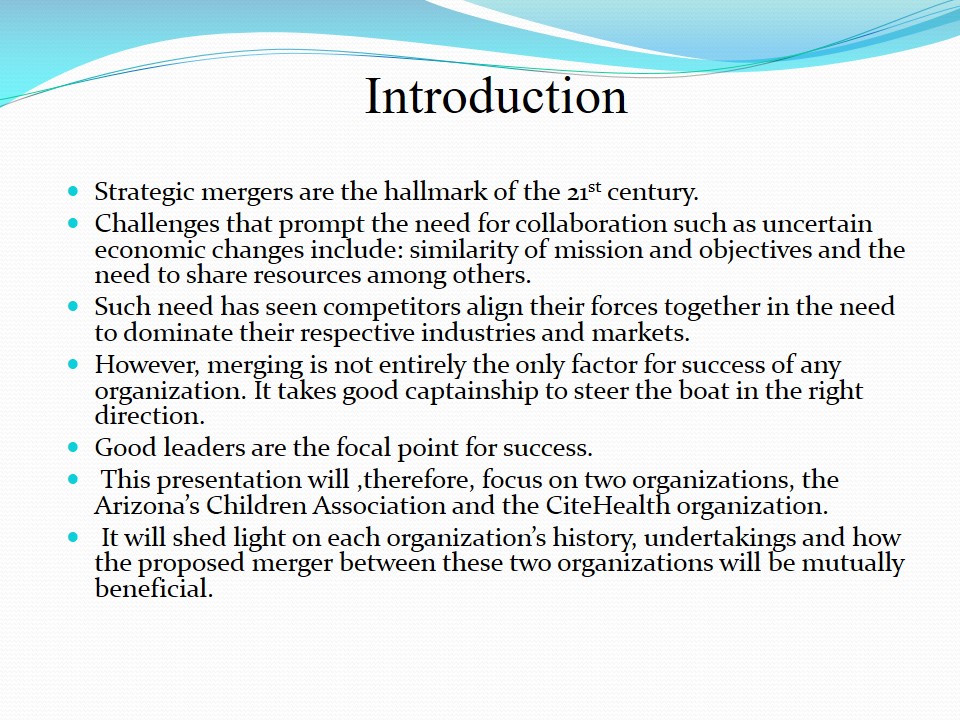
Arizona’s Children Association
- The Arizona Children Association is more than just a children home.
- It has been a safe haven for children as well as families in need for its services.
- It is a state entity registered in the state of Arizona and whose deep and rich history are part and parcel of its existence.
- It is also one of the oldest and largest statewide child welfare and behavioral nonprofit agencies.
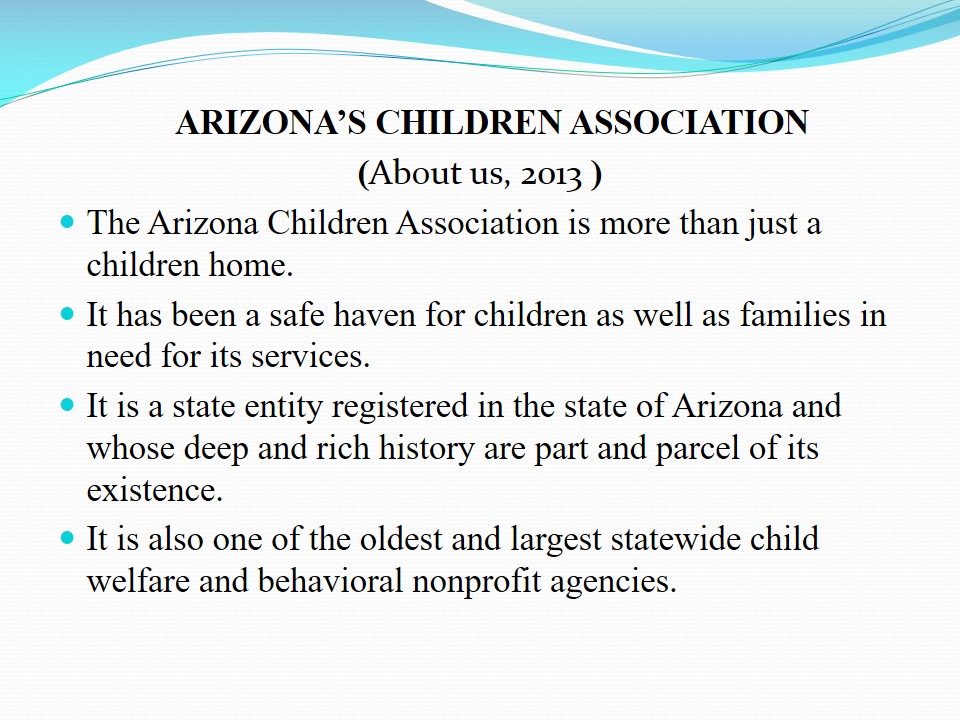
History
- The Arizona Children Association was founded in 1912 with the aim of catering for orphaned and vulnerable children.
- It set out to start a home that would care for the state’s children who needed to find a permanent home, handling the placement locally instead of taking children out of their comfort zone and transferring them to a home in the state of California (About us, 2013 ).
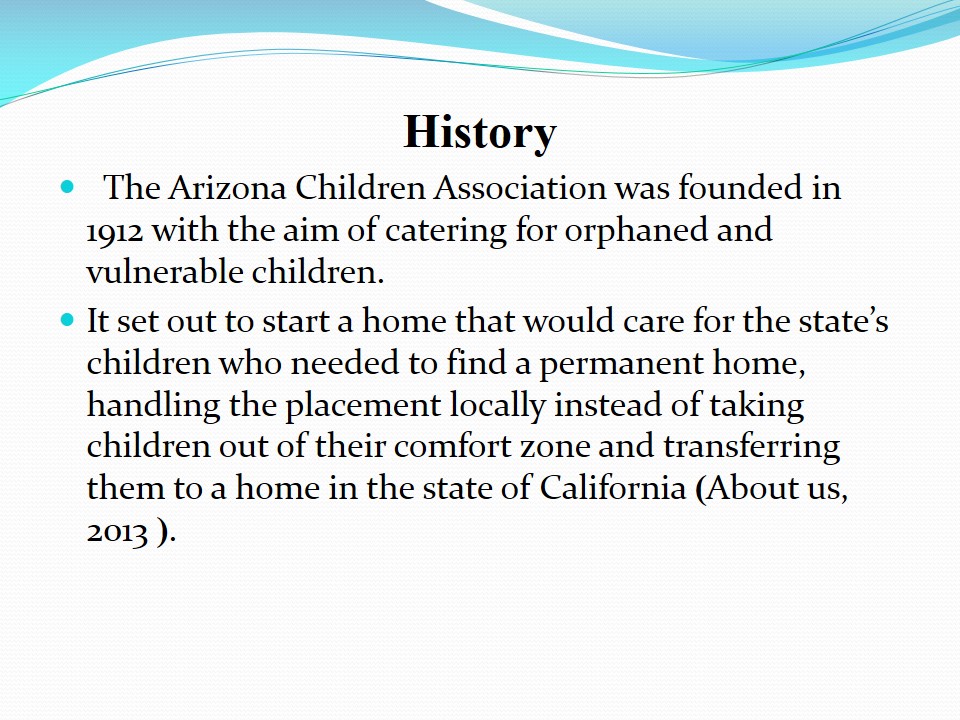
Mission
- Protecting children, preserving families.
- Arizona’s Children Association aims at providing orphaned and needy children a comfortable home as well as creating and sustaining healthy family environments.
Populations
- The Arizona’s Children Association started with a humble population of only six children.
- With time, this figure has grown to an impressive annual population of 45,000 children and their families across all 15 counties in Arizona.
- This is can be attributed to the strategic positioning of the association so as to meet and address the changing needs of children.
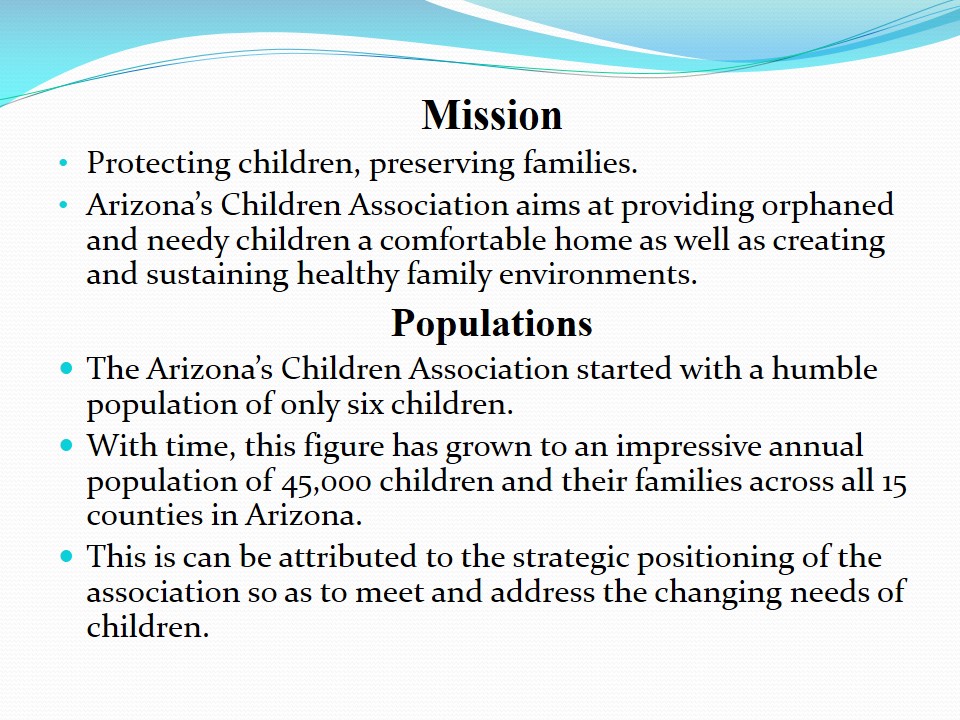
Management
The Arizona’s Children Association is headed by a competent Board of Directors who bring to the table years of experience, skills and resources that have enabled the organization reach the level it is at this present moment.
These experts are committed to offering quality programs and services in a fiscally responsible manner. The day to day operations of the associations are run by the Executive Director, Mr. Fred Chafee, with vast experience in child welfare and behavioral health management.
Financial status
The association has properly kept books of accounts that are audited annually. This helps promote transparency and accountability.
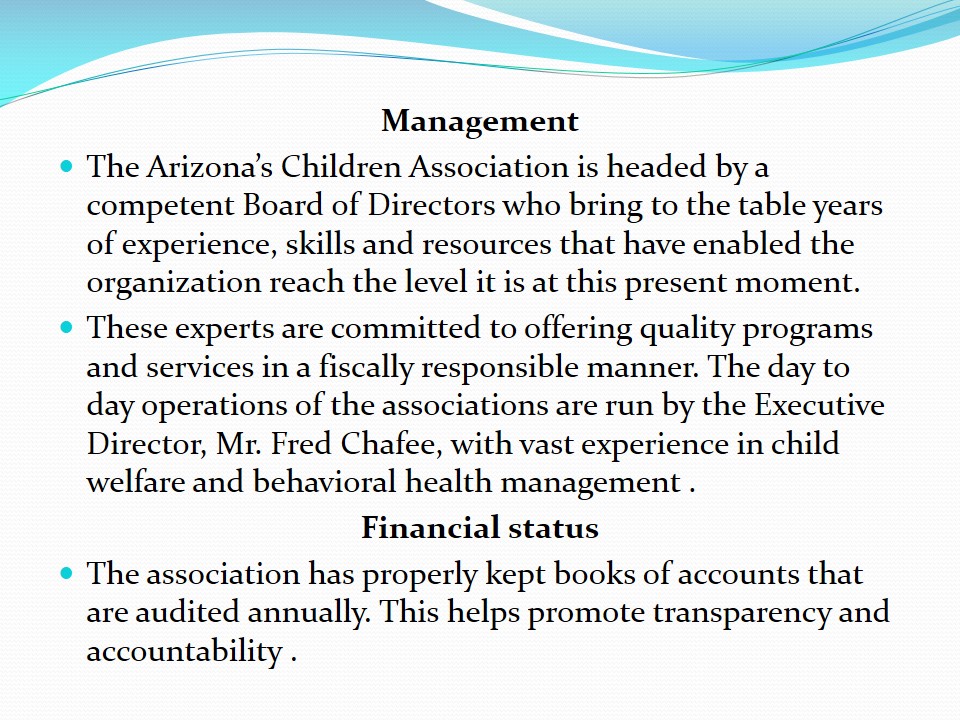
Strategic mergers
- The association has formed strategic partnerships with the following organizations that share the same vision and goals.
- The Parent Connection– A Tucson based agency dedicated to helping children grow into caring, capable adults.
- Las Familias– An organization dedicated to facilitating the healing process for children and adults who experienced childhood sexual abuse.
- Child Haven– An organization that aims at helping children whose families are facing extreme difficulties.
- In My Shoes– This organization was established by alumni of foster care that is dedicated to ensuring that young people experiencing foster care will be supported through their transitional year .
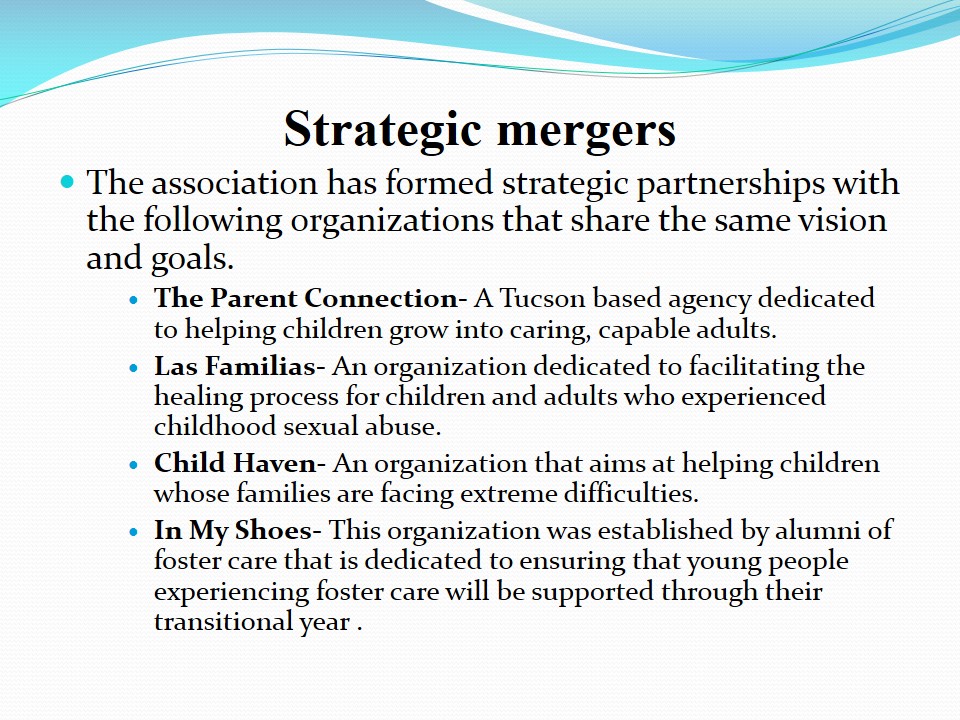
CiteHealth
This is a leading online service company that provides health related information to the public. Its main aim is to provide easy access to health institutions that address specific health related issues (About us, 2013 ).
It provides information on treatment offered and payment options of the following institutions in every state in the country.
- Dialysis centers;
- Home care agencies;
- Hospitals;
- Nursing homes;
- Rehabilitation centers.
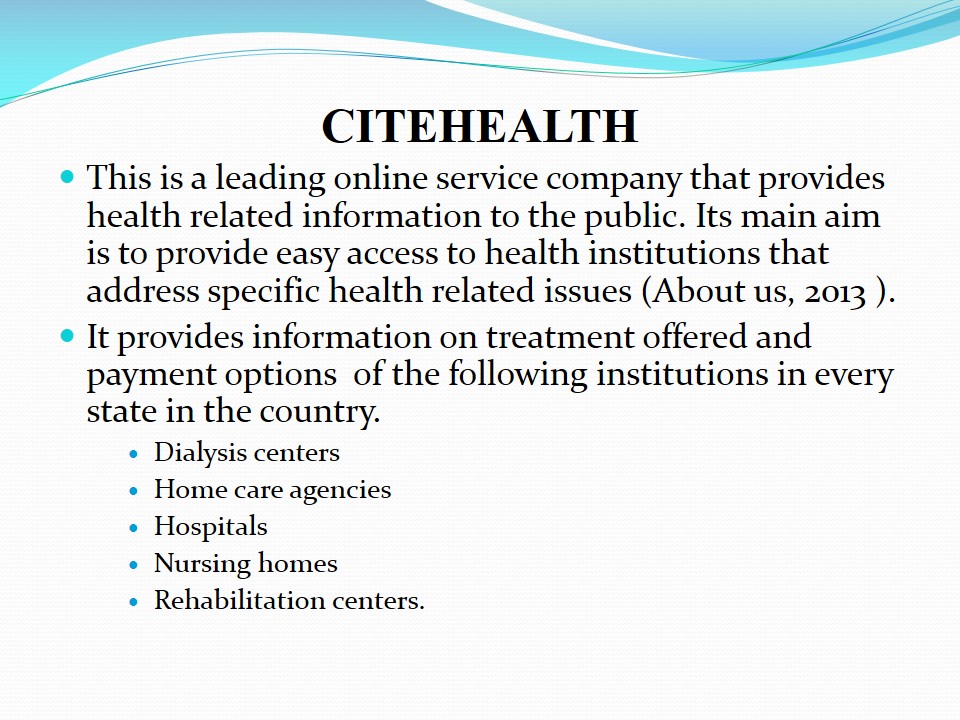
Populations
CiteHealth has clients throughout the 51 states. Based on the category chosen on the website, it indicates the number of dialysis centers, home care agencies, hospitals, nursing homes and rehab centers available in every state.
Financial status
- The company has a stable financial portfolio with financial statements that are updated and audited annually.
- Recent decades have seen an upsurge of network usage among the youth hence increasing the value of the internet business.
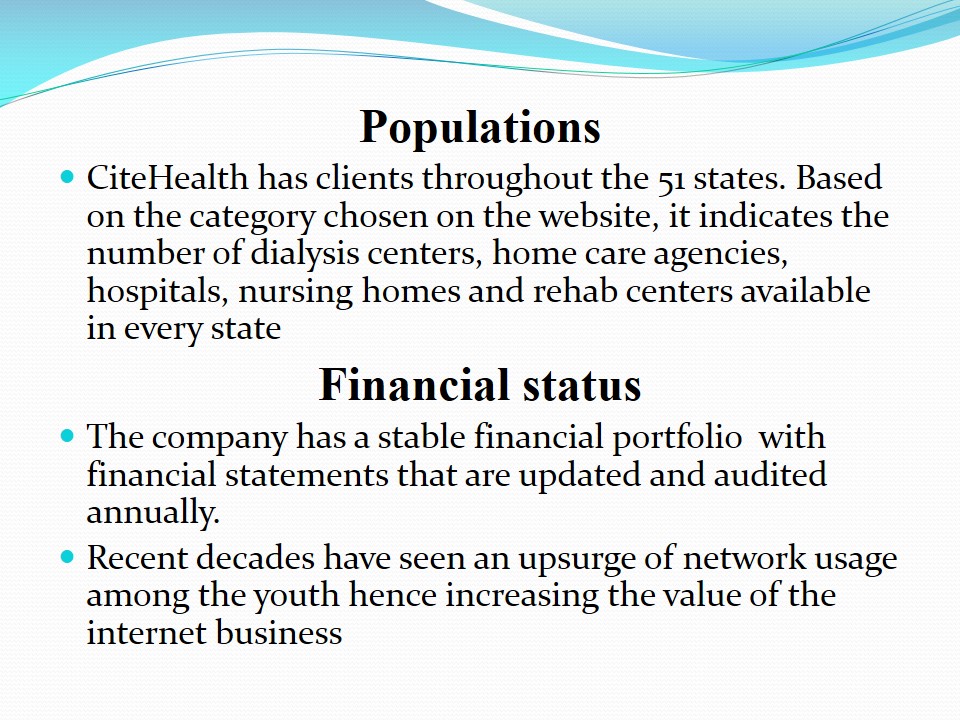
Problem statement
Lack of awareness and inaccessibility of services offered by Arizona’s Children Association amongst state residents as well as the entire country.
Solution statement
Promote accessibility and awareness of Arizona’s Children Association’s services by strategically aligning itself to an online service provider with a similar vision to provide an internet platform for a global audience.
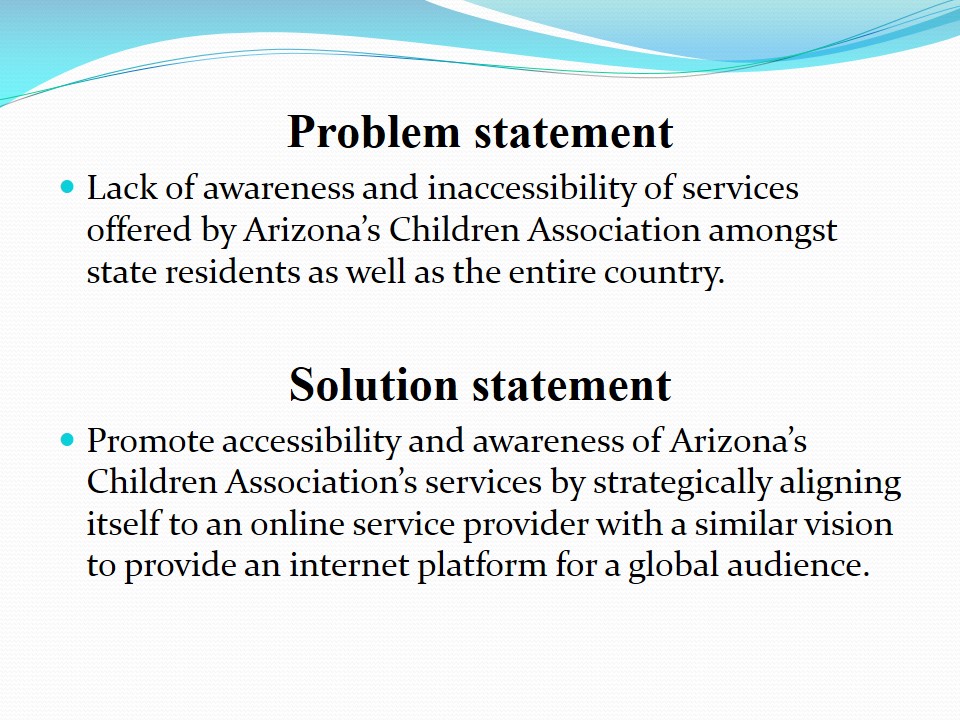
Why Citehealth?
- There is need for Arizona’s Children Association to keep up with the changing demands of the 21st century by embracing technology.
- Therefore, one way that Arizona’s Children Association can achieve this and most importantly promote its accessibility is through a merger.
- CiteHealth is a popular health provider whose vast network is present in every state and can help it achieve this feat effortlessly.
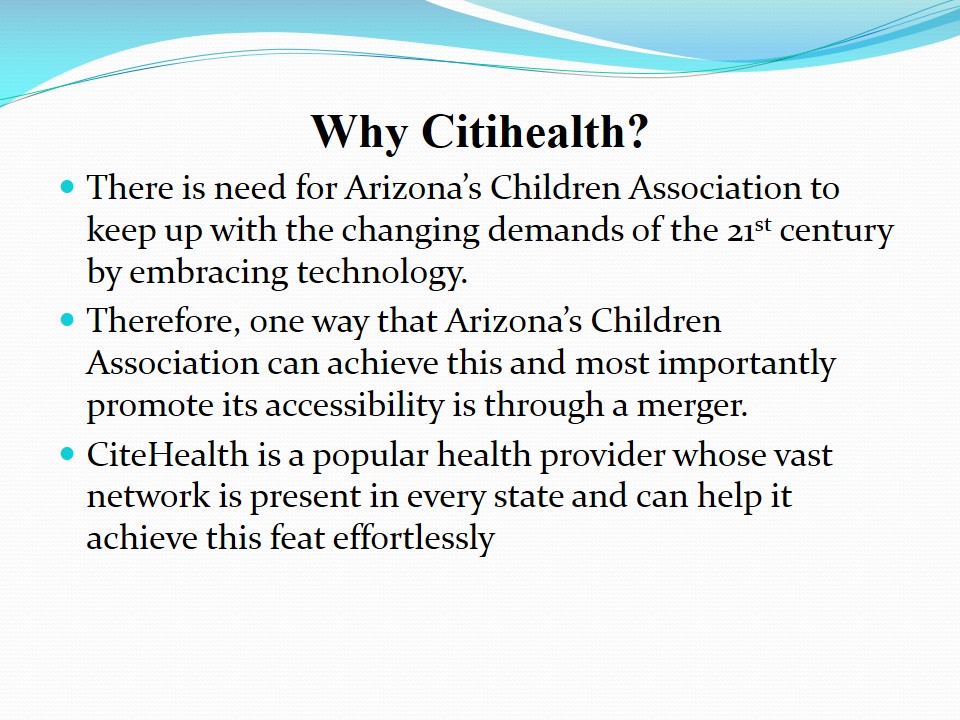
Advantages of the merger
- CiteHealth has a similar organizational culture with Arizona hence both can foster similar work practices.
- CiteHealth mainly focuses on online health care communities. This enables individuals to share health care experiences.
- This merger will provide the much needed attention to the association.
- Incorporation of CiteHealth browser search engine into the association’s browser. Individuals will be able to access the association’s services in the powerful CiteHealth browser.
- Through the Google search Gadget external link, the powerful health care provider search engine will be incorporated into their Google homepage.
- Provide customers with free content about the Arizona’s Children Association which can be utilized by the association in their media distributions.
- CiteHealth accepts additional information on the association which can be posted on the association’s profile. This will increase its publicity.
- CiteHealth also accepts rich media. For instance, the association may wish to include, for example, images, brochures and events catalogues.
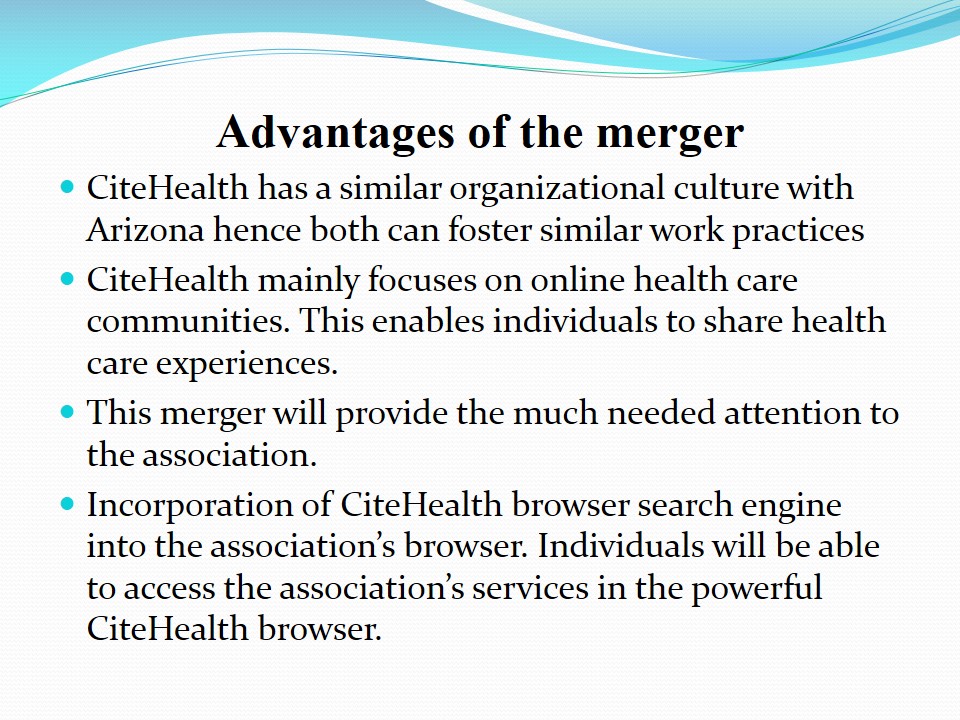
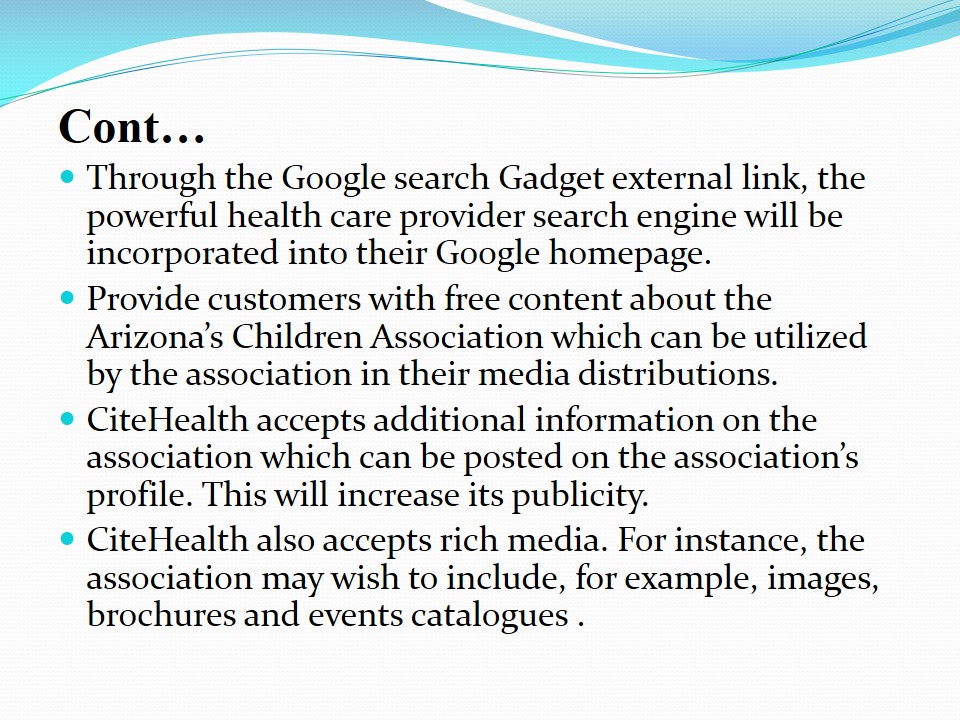
Initiative
- According to Zaiss (2002), partnership is an association between two or more parties that agree to work together towards a common goal for the mutual benefit of all parties involved.
- The delegation that should present a proposal to CiteHealth should be made up of experts that would negotiate a good deal on behalf of the association.
- The team of leaders that should have leadership skills such as good decision making skills, proper planning, evaluation and in general being a good representative of the association, understanding the needs and resources.
- Upon negotiating terms, a contract is signed by both parties. This binding document can be enforced legally as any breach of the conditions specified in the contract will lead to dire legal consequences.
- Each party is, therefore, advised to agree on conditions that define duties and responsibilities as well as consequences if not fulfilled.
- Successful negotiations will lead to organizational restructuring in both organizations . This will see partners being included in the organizational structures.
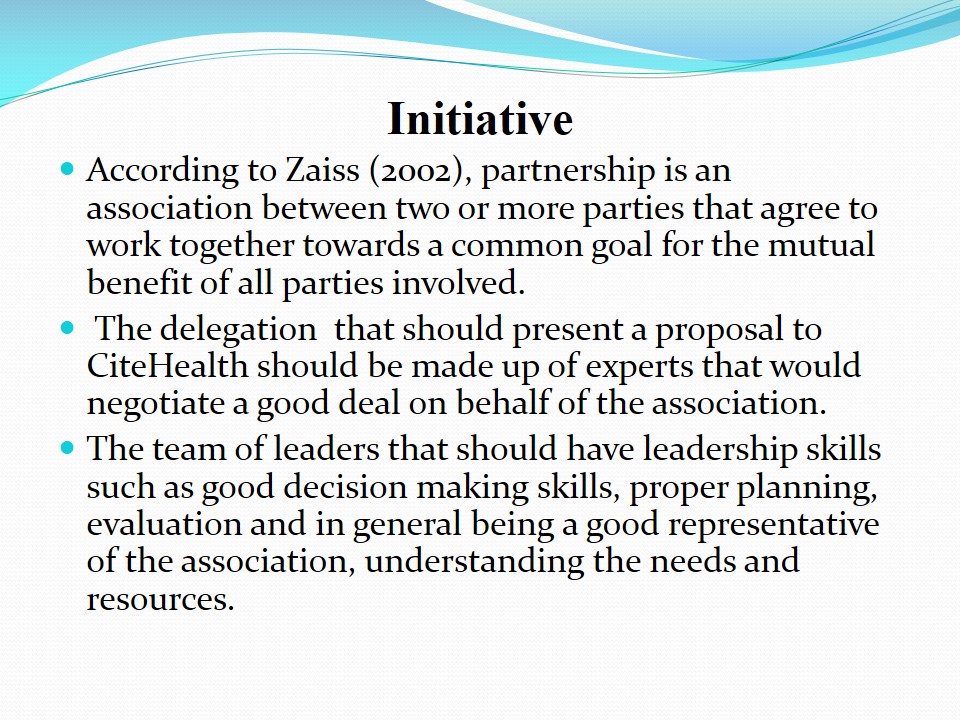
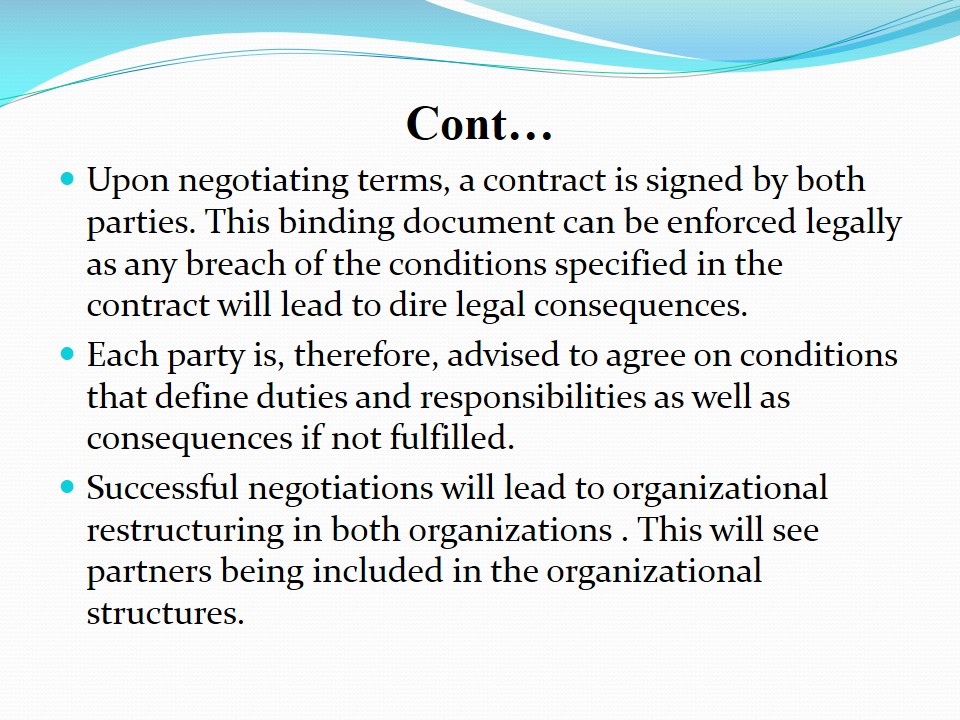
Team building
- Quick (1992), describes team building as a practice that views members of an organization in a team structure rather than as independent members.
- In the case of mergers, this becomes relatively complex. This is because there are two or more organizations involved.
- It will, therefore, take a good leader to unite the organizations involved in order to achieve a common goal.
- Before any team building practices can occur, a team will need to be formed. This will see the group go through the dynamics involved, those of forming, storming, norming, performing and adjourning, as described by Enciso (2010).
- In storming, although members are new to the group, the group leader should outline the purpose and direction of the group and a description of how the team will work. This entails allowing members to introduce themselves to the group.
- In the storming stage, roles and responsibilities become clearer and even leads some members challenging the authority of the leader. It is at this point that the group leader should exercise assertiveness and should be able to hold his/her ground in order to hold the group together.
- At the norming stage, members are more acquainted with each other and hence fit in their positions comfortably.
- At the performing stage, the leader should nurture the development of members by delegating some tasks. The work performed here is seen to be directly coherent with the ultimate goal.
- Finally, the adjourning stage is one the leader is focused on disbanding the team upon satisfaction that the team has achieved the set goals for the sake of the team and the organization.
- Similarly, the same process is bound to occur upon the successful establishment of the partnership between Arizona’s Children Association and CiteHealth.
- This will see the use of simple bonding exercises to the use of multi-day team building retreats that are organized courtesy of both partners. According to Jones (1999) , the following are exercises that could be proposed by the team leader:
- Problem solving or decision making exercises- These involve getting the group to work together to solve difficult problems or make complex decisions.
- Planning or adaptability exercises- These focus on aspects of planning and being adaptable to change.
- Trust exercises- They engage team members in a way that will induce trust amongst them.
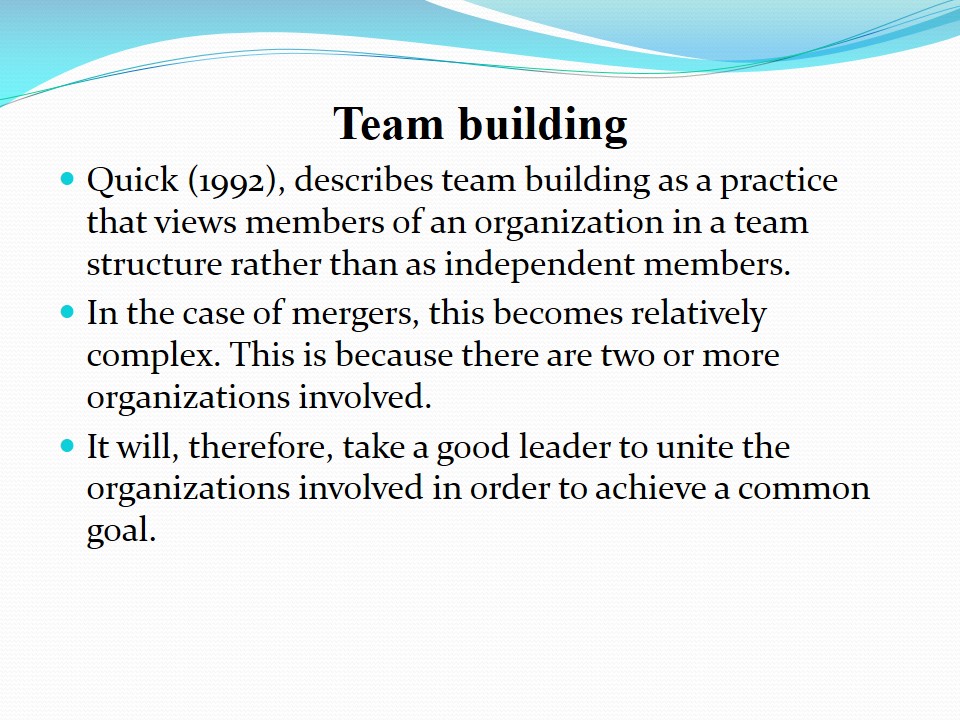
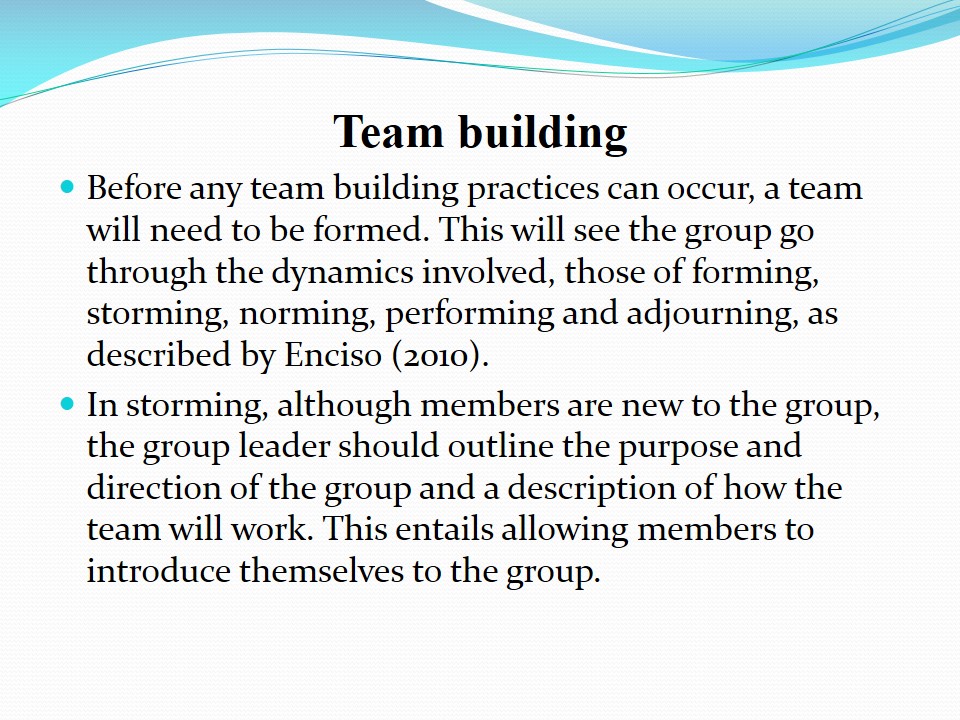
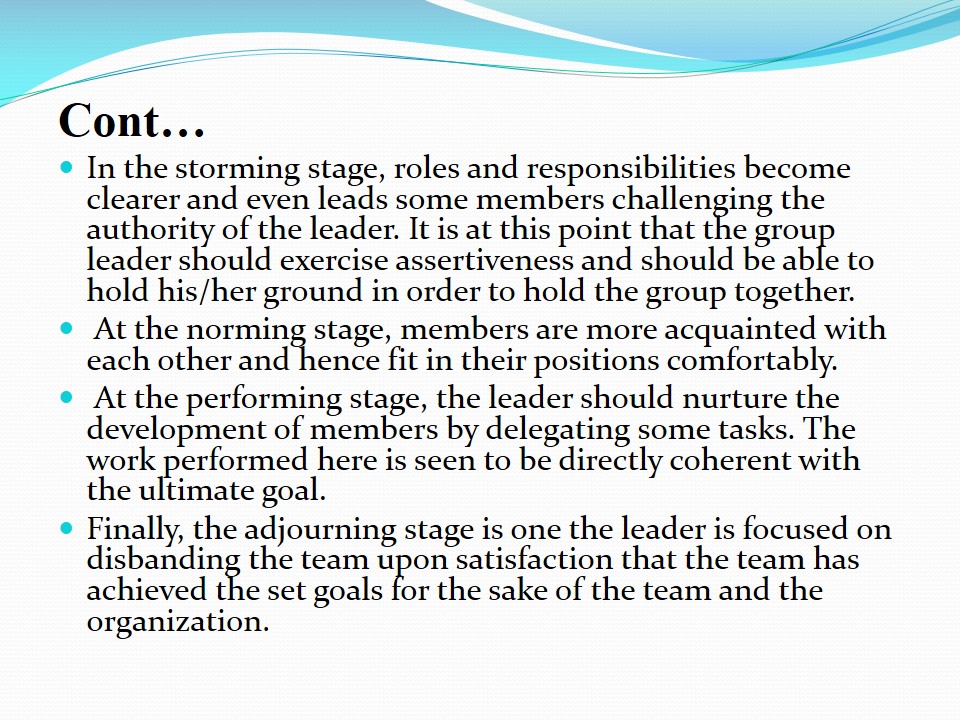
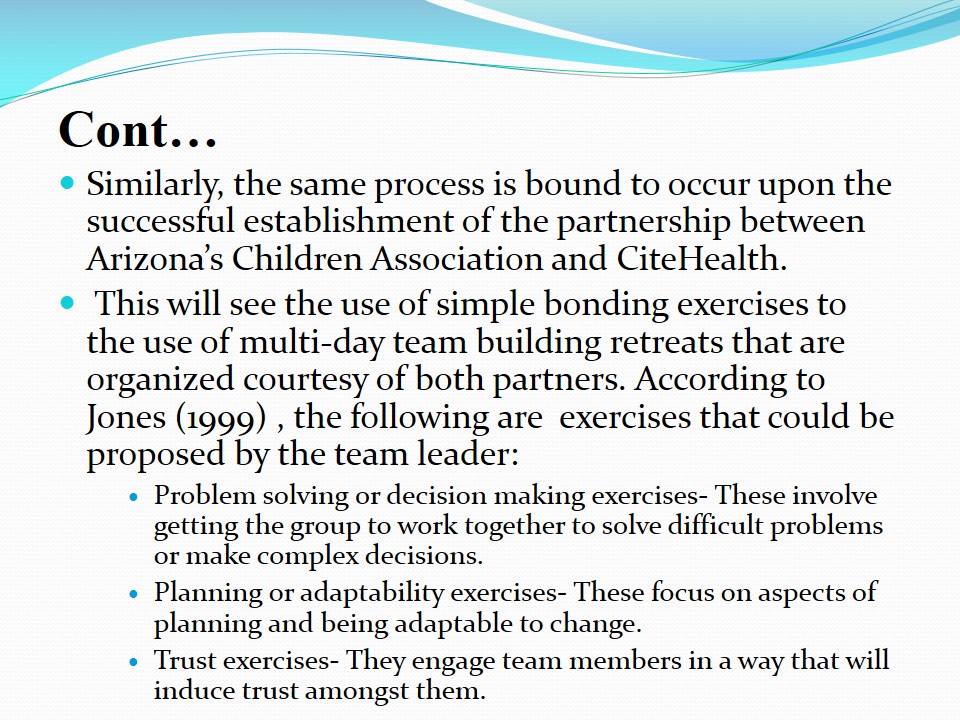
Accountability
- According to Munro & Mouritsen (1996), accountability in a group setting helps cultivate responsibility amongst team members as they must be prepared to justify their actions to the group.
- With proper leadership, members become more inclined and sensitive to group needs rather than their own individual needs.
- In the case of partnerships, since different parties come together as one, there is need to draw proper lines of distinction that will clearly indicate responsibilities vested on each party to avoid conflicts of interest.
- It is a common practice in partnerships to assign duties and responsibilities that are within the party’s capability to cope with the respective demands. This helps achieve optimal performance.
- In this situation, the merger between Arizona’s Children Association and CiteHealth will see members of both organizations work together.
- The activities carried out should also be transparent as both parties are involved in the merger. The decisions agreed upon by each party should be subject to approval of the other party before its execution.
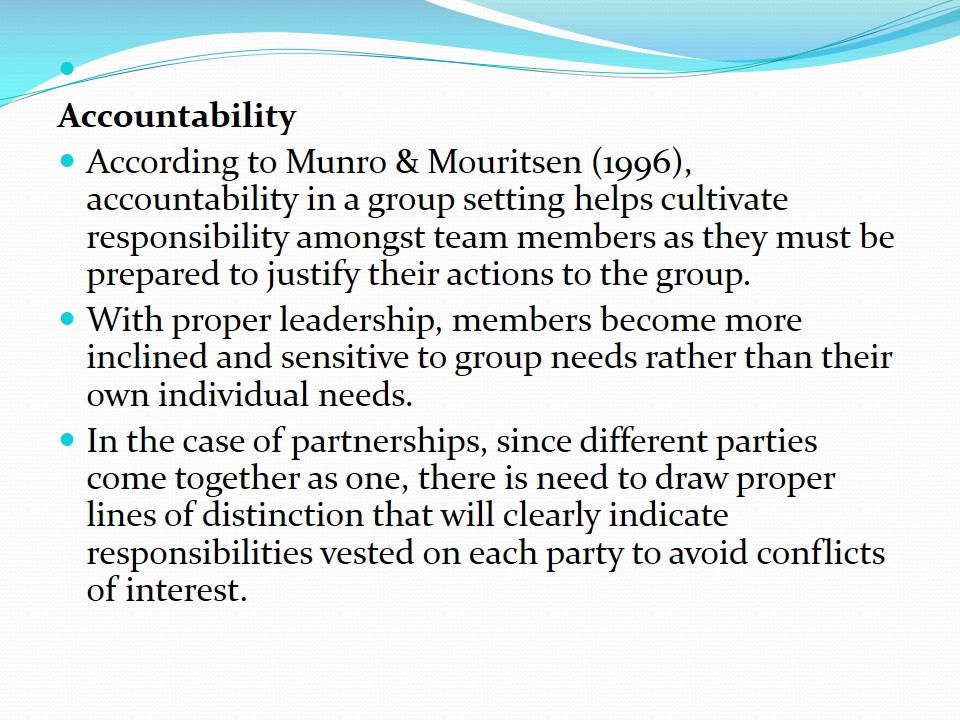
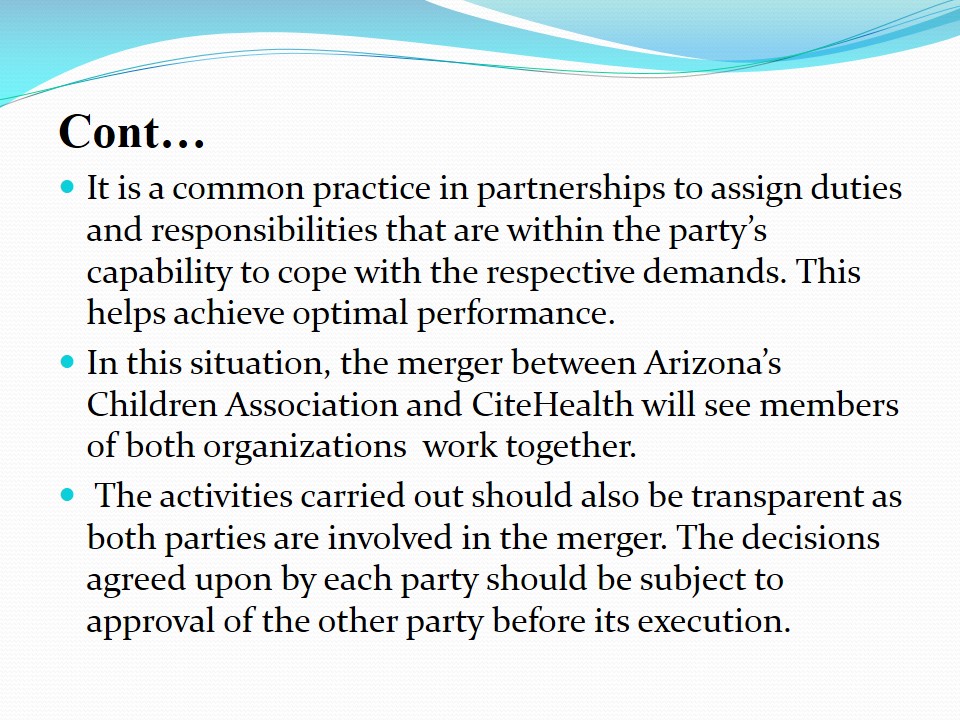
Collaboration
For proper functioning a partnership between the two organizations, good leadership is vital. This is because a good leader will be able to integrate both parties and merge them as one, in a way that they will view themselves as a unified organization. This will help foster unity and promote co-operation.
Even though both organizations are different in terms of their responsibilities, the binding aspect is that both stand to benefit from this arrangement and, therefore, need to work together.
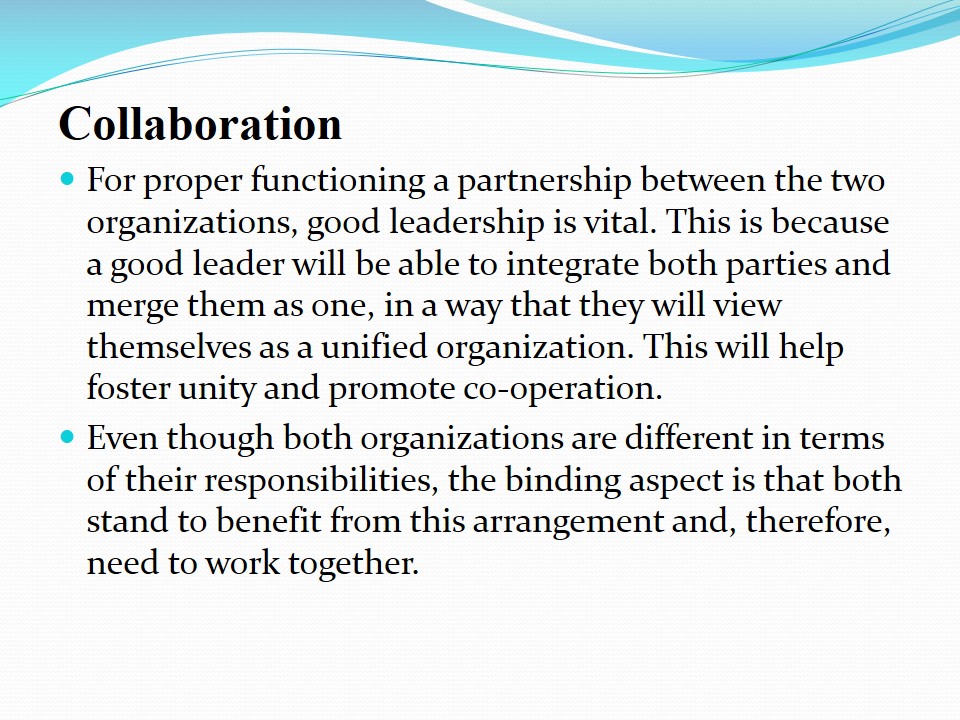
Management/co-ordination
- Any merger is normally accompanied by organizational restructuring as it prompts the affected organizations to merge and form new structures that will accommodate the other party.
- This is a scenario that is likely to happen upon the merging of the Arizona’s Children Association and CiteHealth. Therefore, there is need for proper action to resolve this issue.
- Co-ordination aims at streamlining the activities of one party in order to ensure coherency. This is best achieved through good leadership practices between all parties concerned.
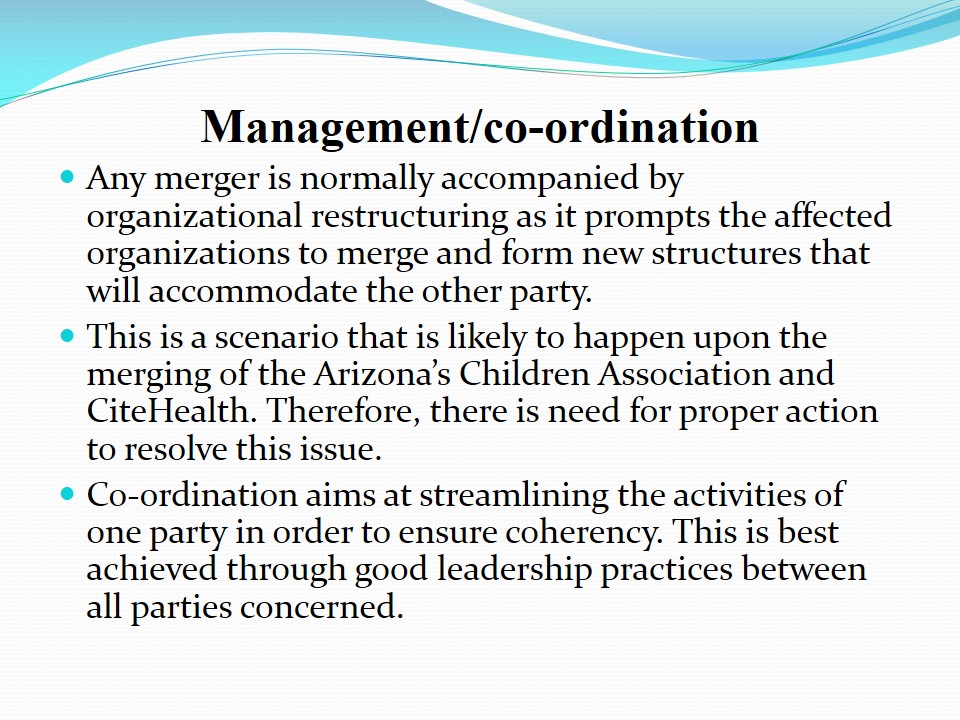
Advocacy
For suitable recommendation to be achieved there is need for proper motivation amongst employees in order to nurture the feeling of pride of being associated with the organization. This is also one of the qualities of a good leader, one who can inspire and motivate the team members.
Therefore, in the case of the two organizations, there is need to identify a good leader to accomplish this task for ease of integration and the transition process, while at the same time ensuring that employee motivation is maintained or even improved.
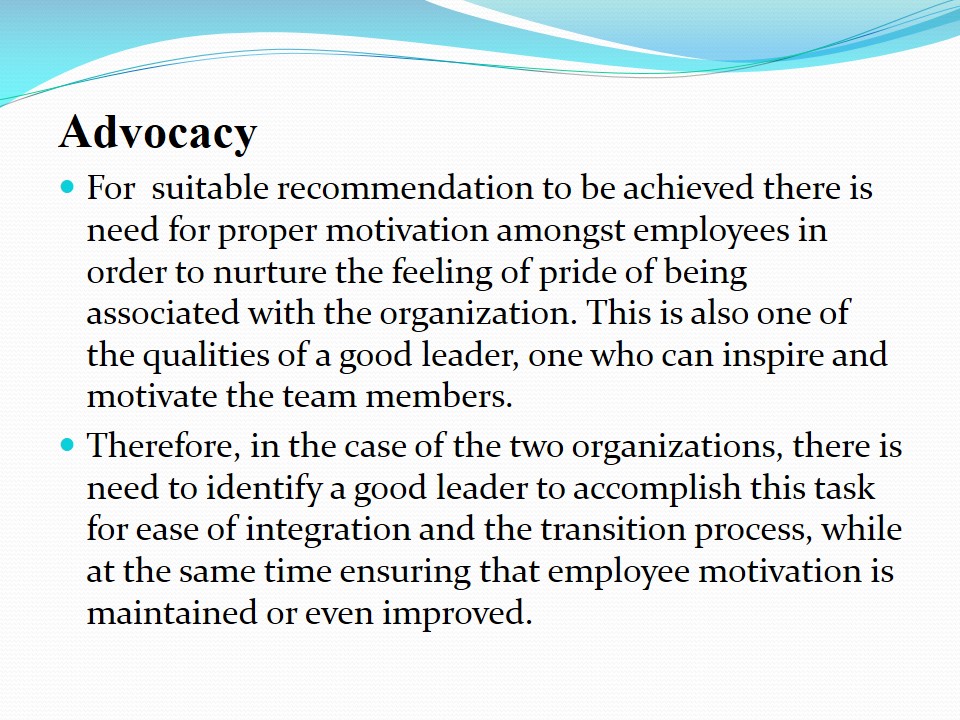
Goal-setting
- Smart goals set the direction of the organization hence enable the firm to focus on achieving them.
- Goals should be SMART. That is,
- Specific;
- Measurable;
- Accurate;
- Realistic;
- Time bound.
- It is, therefore, the duty of a leaders of the merger to clearly specify the goals the new organization hopes to achieve.
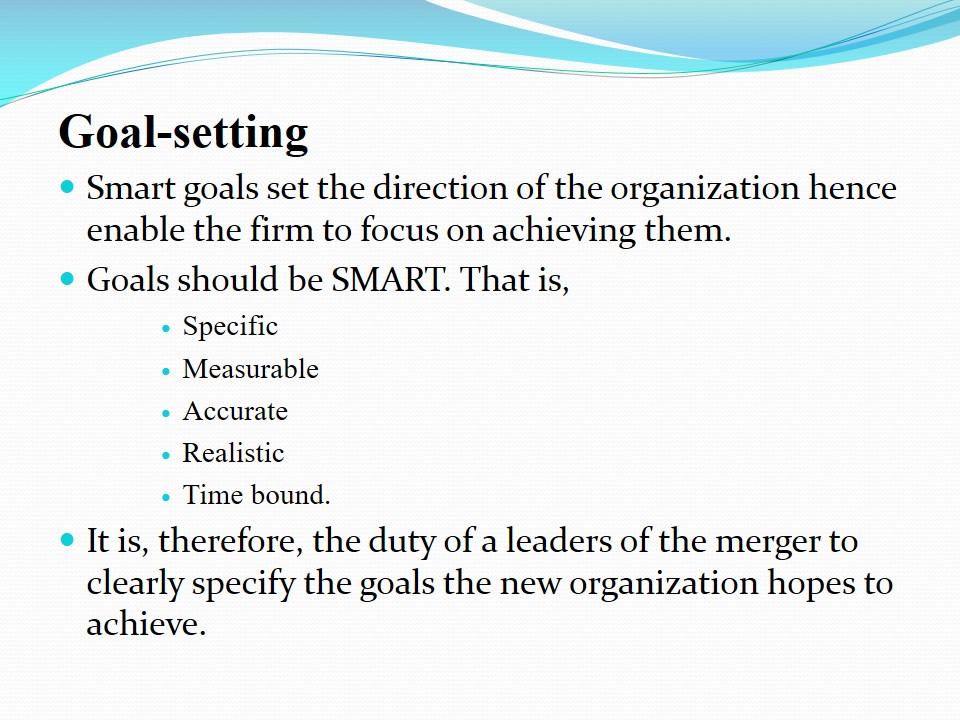
Problem-solving
- Misunderstandings are bound to occur in any organization. There is, therefore, a need to come up with proper mechanisms that will address the problems that may occur to prevent a blown out conflict occurring.
- According to Krantz (1997), the following are strategies the merged organization can adopt:
- Collaborating- in this case, the conflicting parties jointly identify the problem, weigh and choose a solution.
- Accommodating- this involves playing down differences while emphasizing commonalities.
- Compromising- this is a give-and-take approach that involves moderate concern for both the party they are representing and the other party. Each party has to give up something of value.
- A good leader will be able to identify which approach is most appropriate to address the issue at hand.
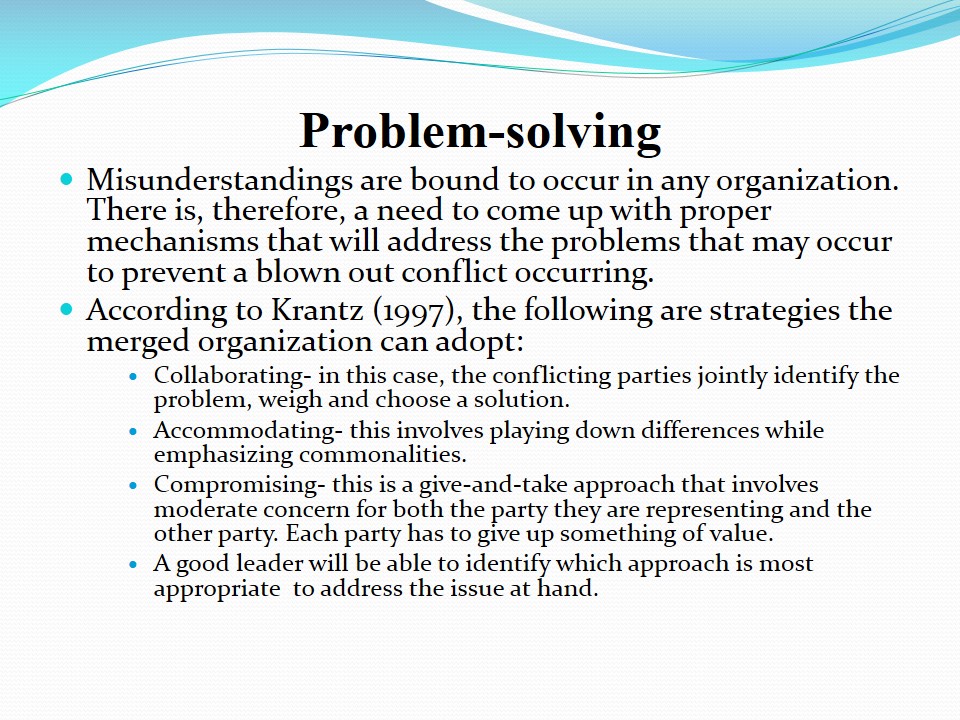
Barriers solution statement
- These focus on team building to create a unified organization and foster team spirit as well as employ problem solving mechanisms to address issues related to conflicts arising from differences in opinion.
- The barriers that are most likely to occur include the following:
- Integration– there is a challenge in incorporating different structures as the two organizations are different in terms of the business they are both involved in.
- Employee morale– motivation levels of employees are likely to be compromised. This is as a result of the restructuring as the roles and responsibilities held by individuals may end up being compromised as a result of the restructuring process.
- Conflicts- Different individuals have their own opinions and if they are not listened to and appropriate action taken, it could lead to the collapse of the entire arrangement.
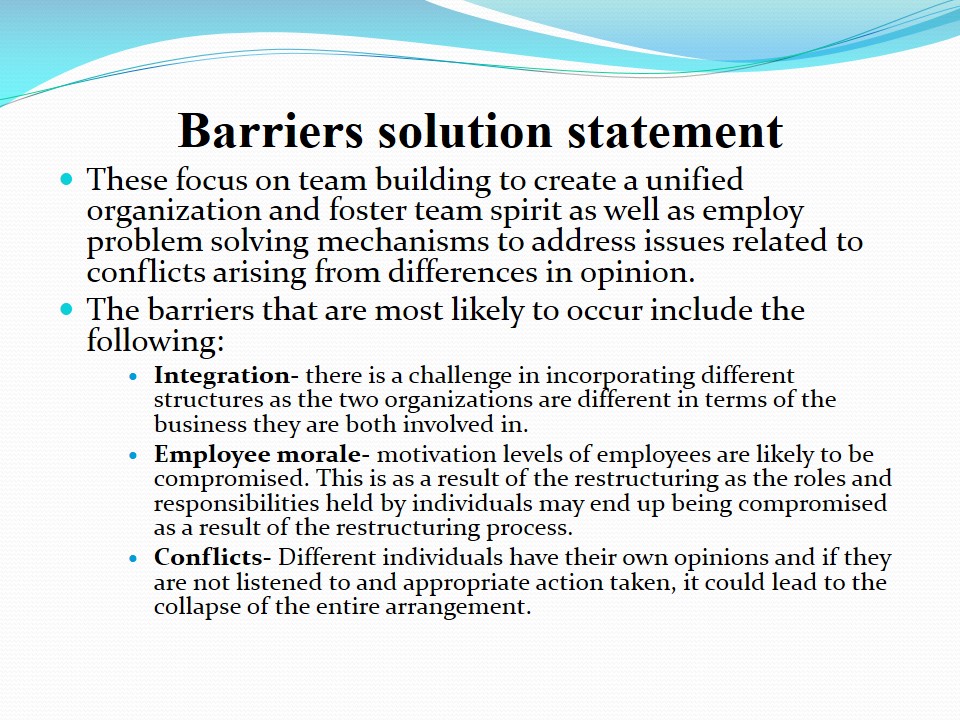
Resources required for this project
In the case of the merger arrangement, each organization has something to offer and should do so freely if required to make the project successful. The following are resources that are required in this project.
Point to note: these costs are calculated based on the number of team members, which is 20, 10 from each party. The proposed workshop is scheduled to take.
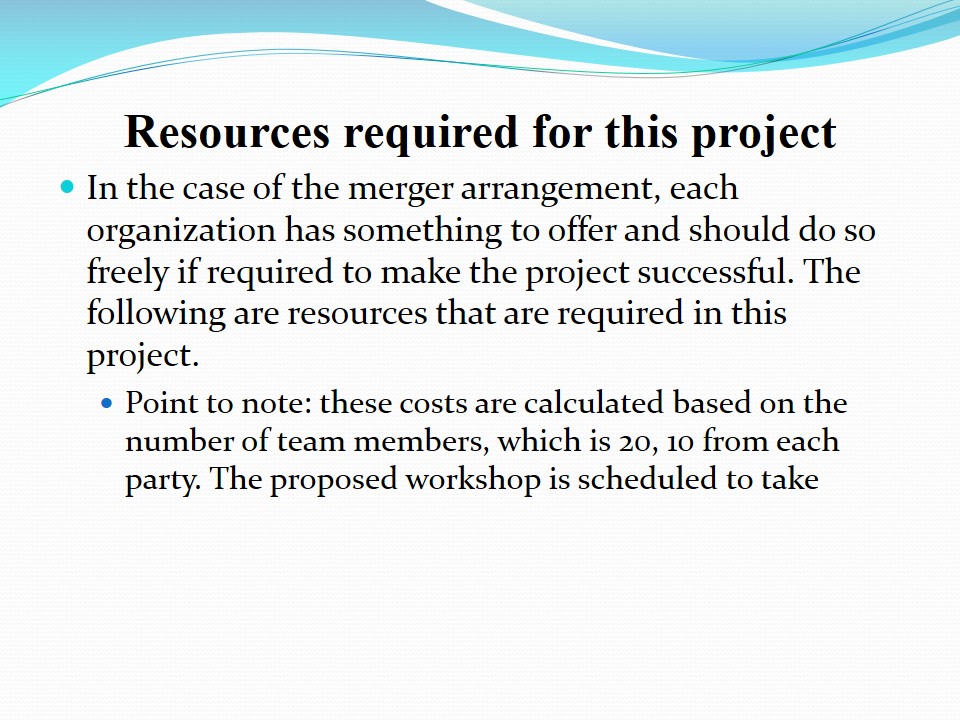
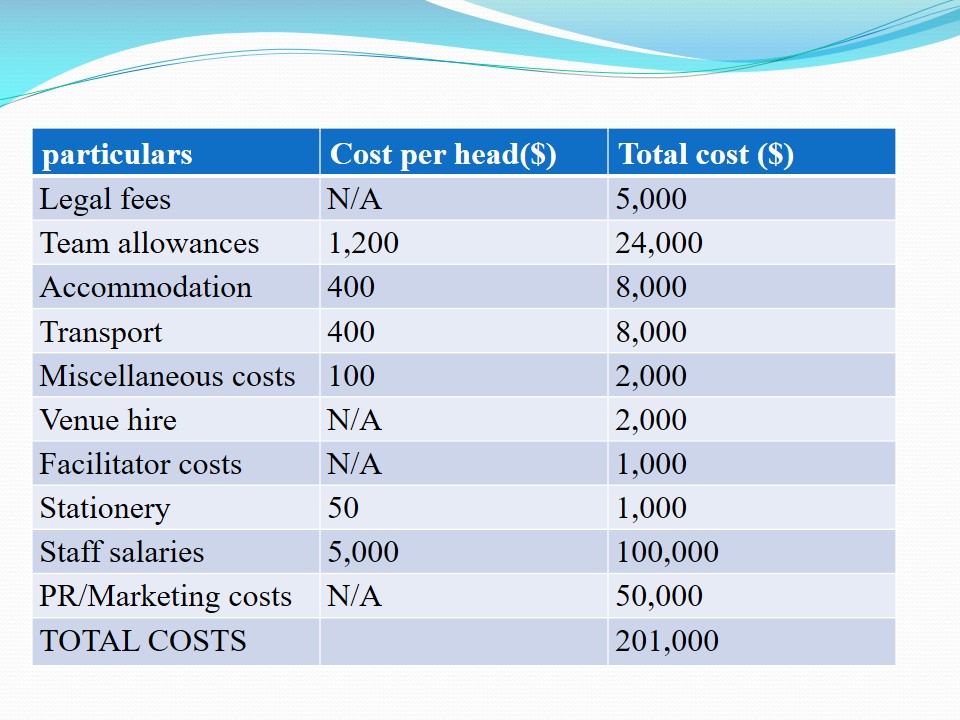
Vision
- Once the project has been completed, the output will comprise of an even larger organization that has undergone proper restructuring and that has defined structures specifying the roles of each individual.
- The organization will have a larger workforce that includes employees from each respective organization.
- It will benefit from the improved client experience as they will be able to access services offered by each organization.
- The Arizona’s Children Association will see the improved awareness brought about by its partner, CiteHealth. This fastens the achievement of the goals of both organizations.
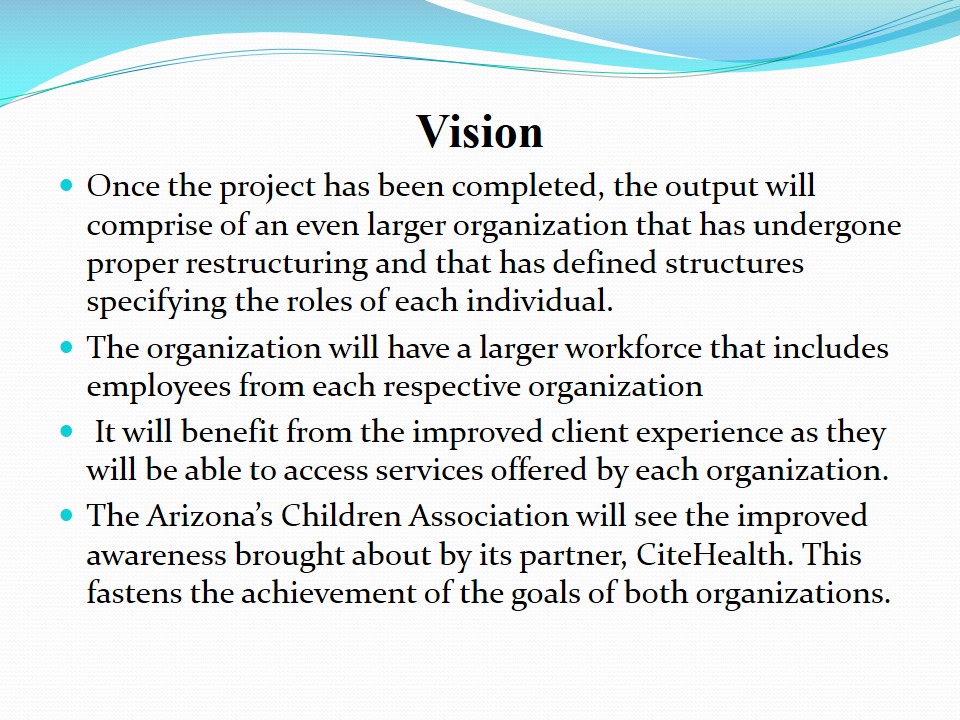
Outcome indicators
- Number of clients visiting the site- this will mean that more clients are more aware of its existence as well as services it has to offer.
- Number of registered clients- the increase in the number of clients who actually register to use one or more services in the site depicts confidence in ability of the association to deliver.
- Income revenue- if the project is successful, each organization will register growth in terms of its income revenue.
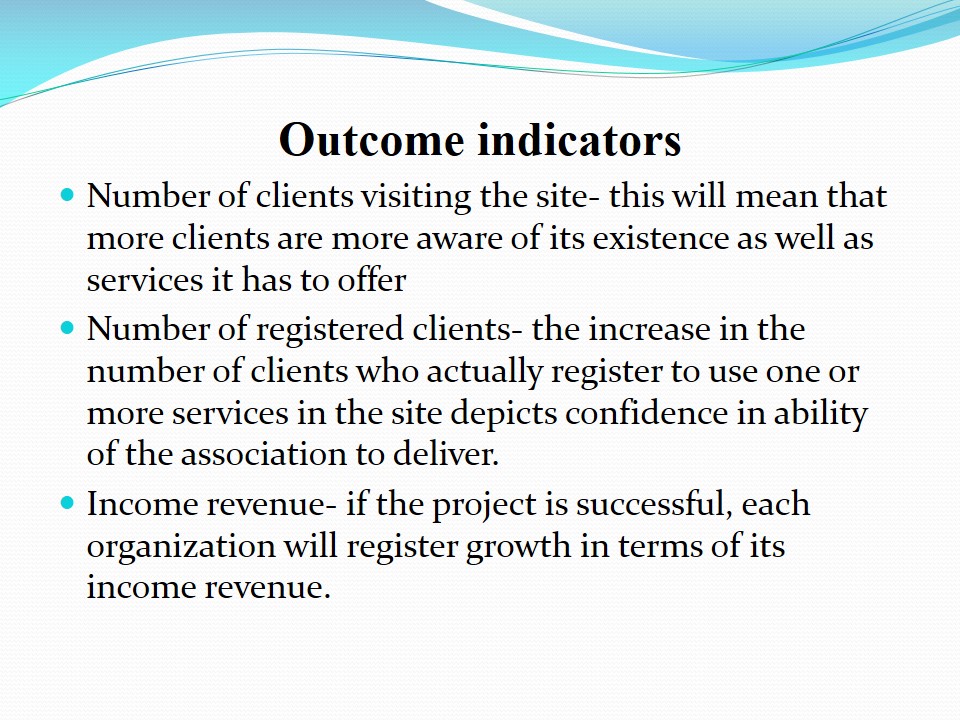
References
About us. (2013). Web.
About us. (2013). Web.
Enciso, Z. (2010). Cooplexity:A model of collaboration in complexity for management. New York: McGraw-Hill Publishers.
Jones. A (1999). Team-building activities for every group. Chicago: Jossey-Bass Publishers.
Krantz, G. (1997). Techniques of problem solving. Ohio: Routledge Publishers.
Munro, R & Mouritsen, J. (1996). Accountability: Power, ethos and the technologies of managing. Wisconsin: Sage Publishers.
Quick, T. (1992). Successful team building. New York: McGraw-Hill Publishers.
Zaiss,C. (2002). True partnership: Revolutionary thinking about relating to others. New York: Sage publishers.